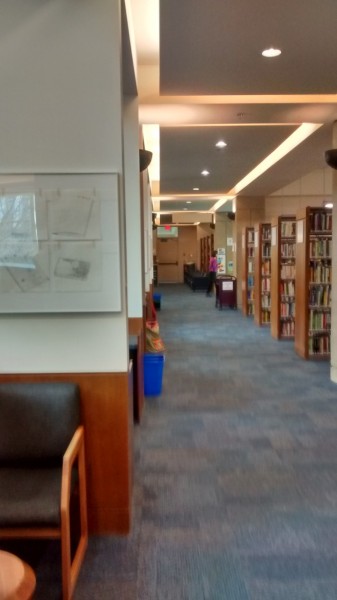It’s not a new wave, it’s just you and me: Lili and the Migratory Influences
Bernadette Phan’s ‘Lili and the Migratory Influences’ is located at the Bob Prittie Burnaby Public Library, embedded in an area reserved mostly for studying students.
Imagine yourself, studying. It’s been a few hours and you’ve become rather frustrated with your work so you take a break and look up at the blank wall above you for inspiration. You see four still-life drawings of book covers, arranged 2×2 and sharing a frame. Every so often, but with increasing frequency, you return to the drawings. You recognize some of the names. You look up the ones you don’t. You know enough to see that all the books are in French but you also know that not all of the authors wrote in French. Eventually, though, you lose interest: it’s been a long day and you’re tired and your frustrations are only getting worse. But before you leave you decide you want some context for the drawings that have been keeping you company. You learn the books once belonged to someone named Lili: born 1938, died 2008. The books were brought back from Paris and are part of an exhibition by her niece, Bernadette Phan. You want to know more about Lili, beyond her bookshelf, but aside from some scant biographical details her bookshelf is all you’re given.
Or maybe you don’t do any of this or learn anything – maybe you just leave. For most who will see them the drawings will be nothing more than a passing curiosity.
Here are some of the names on Lili’s bookshelf: Mishima, Deleuze, Spinoza, Nietzsche, Gramsci, Yourcenar, Jules Verne, Franz Boas, Cao Xueqin. Most are authors; some are subjects. As a narcissist my thoughts naturally turned towards my own bookshelf – how all my books are in English, and the ways it’s been shaped by years of literature classes. What would only my bookshelf say about me? But also, what would it say once you add in: my birthdate, my place of birth, my ethnicity?
From her bookshelf we know that Lili read primarily, if not exclusively, in French. We know by her collection of philosophy that she was erudite. We know that she read work from all across the world. One of the things that ‘Lili and the Migratory Influences’ does, though, is test the limits of how much we can ethically assume about someone’s experience with limited knowledge. We can surmise a lot about Lili based on her book collection, but that vision of her is inherently an incomplete one. The fact that Lili was Vietnamese living in France, born when she was, seems to promise so much insight into her life given the histories between the two nations. That her books written by Vietnamese authors (Du Nguyen, Pham Thi Hoa) are in French clearly means something. Of course her ethnicity had to have informed her experience somehow. But in what ways, I find myself at a loss to articulate without resorting to assumptions rooted in generalization instead of in Lili as who she actually was. But that might speak to a larger point – that even though the migrant has had her identity shaped by the experience of migration, the way her identity has been shaped is particular to her.
